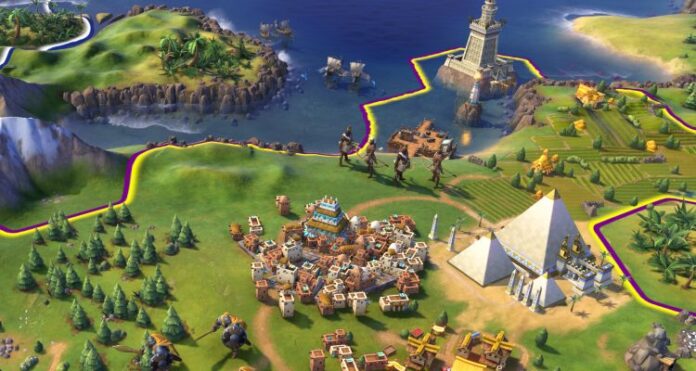With nearly 1,600 titles in my game library, I have an undeniable favorite—the one I’ve dumped about 800 hours in: the six-year-old game Civilization V. The Civilization series is a time warp, a black hole where gamers blink from starting with a single settler at 9 p.m. and end up bleary-eyed when they get surprised by the first light of dawn after saying “just one more turn.” Civilization V was fantastic—certainly the best representation of the series—until now.
Civilization VI is the latest title in the storied series, and it’s bound to lift the well-loved Civilization brand to greater heights. Firaxis seemed to learn a lot from the gaffes of its last Civ title (Civilization: Beyond Earth), and was able to hit that freakishly delicate balance between introducing changes that improve the series and keeping things familiar to prevent alienating old fans.
The basics remain. It’s still an inspired 4X game where players need to “eXplore, eXpand, eXploit, and eXterminate” in order to win. You still settle cities to build your empire, utilize resources and maximize tiles to gain advantage, produce military units based on technological achievements, and try to dominate the map through culture, science, and diplomacy… or if all else fails, engage in turn-based warfare. Everything was intuitive enough to get an old Civ player like me to just dive into the new game. The tutorial scenario, in particular, would be useful for new players to grasp the basics of Civilization VI right away.
Enhanced game experience. The most obvious is the introduction of Districts where you build city improvements on separate tiles other than the one used by your city. Now, you’d have to think long and hard about the things you build because space is always a finite resource and placement determines adjacency bonuses. A separate development tree for Technology and Civics adds a new layer of options in your overall strategy. Improved artificial intelligence—an element that was almost universally criticized as lacking in Civ V—is apparent. Now, Civ heads have agendas that tell you what they want instead of being inconsistent leaders that seemingly can’t stand on their principles. There are still kinks to improve, of course, but at least there’s some semblance of sense to the attitude of Civ leaders now.
New art style. It’s more colorful, more cartoon-like. I prefer the pseudo-realistic style of Civ V, but that’s a preference, not a criticism. The game certainly looks more alive now; one look at your screen and you can immediately see what’s happening in your city—what you have and what you’re sorely lacking, even without going to the detailed city screen. The World Wonders (huge construction projects that you undertake to secure key bonuses) are certainly a joy to behold. No longer do I have to zoom all in to my city and squint to gain a glimpse of the Eiffel Tower or the Hagia Sophia or any other grand edifice that I’ve built. Now, the Wonders take a tile of their own and they’re undeniably magnificent to look at.
Map for exploration. Even the old-style map that replaced the Fog of War is a welcome change. Instead of just seeing black for the areas you haven’t visited yet, Civ VI’s brown, old-fashioned maps make you feel like Marco Polo and entice you to go exploring.
Feast for the ears. The game’s soundtrack is something that usually doesn’t get as much attention as other game elements, but in Civ VI, it shines. Every civilization has its own background music, and it changes as your civilization evolves through the ages. England’s haunting “Scarborough Fair” mix of bare strings and wind instruments at the Ancient Era sets the perfect tone for humble beginnings; the same song—now with synthesizers amid a symphony of various instruments—will then pump you up for glorious conquests for the exaltation of the British Empire when you reach the Atomic Era. It’s a simple element, something you’re unlikely to notice while you’re busy employing spies to undermine other civilizations, but it’s indicative of how much love and detail were given to the creation of the game.
Epic VO. Add Sean Bean’s distinctive voice as he narrates your civilization’s achievements and suddenly, everything you’ve been doing sounds so heroic—even when he talks about something as mundane as air conditioning. When Leonard Nimoy was featured as the voice of Civ IV, there was an implicit inspiration that your modest village will one day launch ships to the stars. Civilization VI’s Sean Bean is just as superlative. He makes it sound like every choice you make is epic, and that there are far-reaching consequences to your decisions.
A choice at every turn. There’s always a need to prioritize, and you’d have to accept that even your capital city may not have everything—not if you want to win. There’s always a trade-off, and it keeps the game more engaging. Not only is there a tug-of-war between prioritizing what your cities are producing, but there’s also a struggle in space allocation. Erecting Industrial Zones may speed up your current production, for example, but that means you’ve probably demolished forests that you’ll need later to build the culture-boosting National Parks.
More engaging mid-game. Civ games used to be characterized with a mad rush at the early part (scouting the map, securing resources, etc.), and then a boring mid-game where everyone sort of hunkers down and concentrate on growing their empires, and then finally an explosive end-game where the players find out whose strategy will pan out. With the ever-present need to prioritize and the introduction of “Eureka moments” (mini-objectives that halve tech/civic research times), Civilization VI’s mid-game feels just as exciting as the other parts. Every turn feels pivotal. Every choice gives you options to head down another path that could make or break your domain. Every turn counts.
VERDICT
In many ways, Civilization VI is the best vanilla Civilization game ever launched. Every game element blends together like a powerful symphony. And it’s far more challenging than Civ V—and also more fun. When you look at your civilization near the end-game, you can’t help but recall the pained choices you made in your campaign in order to balance the varied needs of your empire. There’s a story in your empire and you’re the one writing it—the story of your civilization’s journey from the mud to the stars.
| Developer | Firaxis Games |
| Publisher | 2K Games |
| Platforms | Microsoft Windows, OS X |
| Genre | Turn-based strategy |
| Modes | Single player, multiplayer |
| Price | P2,840 (Steam Digital Deluxe Edition) |














